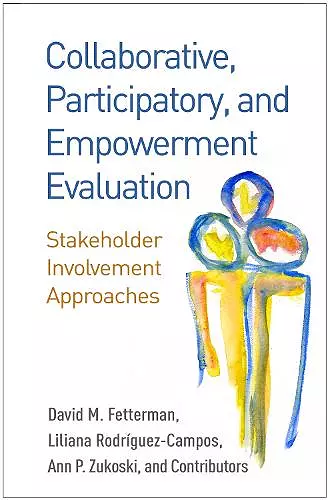Collaborative, Participatory, and Empowerment Evaluation
Stakeholder Involvement Approaches
David M Fetterman author Liliana Rodriguez-Campos author Ann P Zukoski author
Format:Hardback
Publisher:Guilford Publications
Published:18th Jan '18
Currently unavailable, and unfortunately no date known when it will be back
This hardback is available in another edition too:
- Paperback£34.99(9781462532827)

From pioneering leaders in the field, this is the first book to provide a solid foundation for three major stakeholder involvement approaches: collaborative, participatory, and empowerment evaluation. Highlighting differences among the approaches, the authors focus on the role of the evaluator, who may be in charge of the evaluation, share control, or serve as a "critical friend," leaving stakeholders in control. Practitioners are guided to select and implement the most appropriate framework for the purpose and scope of a given evaluation and the needs of community members and funders. For each approach, a chapter on essential features is followed by two chapters presenting actual sample evaluations--for example, early childhood and community health initiatives, an aquarium, a project with Google, and more. The concluding chapter discusses similarities and circumstances in which the approaches can be combined.
“This valuable book both shows and tells on the hot topic of collaborative, participatory, and empowerment approaches. Each 'essentials' chapter gains impact from two chapters illustrating what the principles look like in actual evaluation practice. Beautifully explanatory, memorably demonstrated! The authors emphasize understanding in order to select the most appropriate stakeholder approaches for the situation at hand. Far from claiming the exclusive benefits of any single approach, the book is infused with the spirit of working together. The chapter on commonalities powerfully lays out the features of stakeholder involvement at macro-, mid-, and microlevels of analysis, creating a strong theory-to-practice bridge for newcomers as well as experts. I wish I could gift-wrap this book and send it express to evaluation practitioners in fields from agronomy to zoology."--Lois-ellin Datta, PhD, President, Datta Analysis, Kailua-Kona, Hawaii
"An invaluable contribution. This book adds very helpful perspectives and insights to an enticing and alluring--but largely still under-defined--set of evaluation methodologies. It provides focus, helpful guidance, and more nuanced, differentiated conceptualizations of collaborative, participatory, and empowerment evaluation. The conceptual framing of the methodologies and the inclusion of both domestic and international cases make the book particularly helpful for training and preparing novice evaluators. I really appreciate the simplicity and clarity of the writing, as well as the specificity of the processes and procedures described. This will be a useful core text for my graduate courses in monitoring and evaluation for development practitioners, and I expect my students to keep it as a reference guide when they enter the professional field."--David Bell, EdD, Department of International Development, Community and Environment, Clark University
"This book uses in-depth case studies by experts in the field to explore and highlight principles and practices of the three approaches. I found the organization very useful. I particularly appreciate the inclusion of concrete suggestions and timelines, the information on how the approaches might be applied in different contexts, and the attention to ethical concerns regarding working with marginalized or vulnerable populations. Specifying ways that the approaches can be used in one-time or multiyear studies expands the utility of the volume. Students often express the desire for practical information about how to conduct evaluations--this practical volume, nested within theoretical and methodological frameworks, addresses this need."--Isabel Bradburn, PhD, Department of Human Development, Virginia Tech
“The authors provide a robust overview of the three models of stakeholder involvement. Offering a thoughtful and informed perspective, this book is a welcome addition to an evolving field. It will advance evaluator expertise as well as stakeholder participation, evaluation capacity, and use of findings. Side-by-side case studies demonstrate the flexibility of the three models under different evaluation scenarios while guiding evaluators on the practical aspects of incorporating stakeholder involvement in their designs."--Annette L. Gardner, PhD, MPH, Department of Social and Behavioral Sciences, School of Nursing, University of California, San Francisco -
ISBN: 9781462532834
Dimensions: unknown
Weight: 412g
172 pages